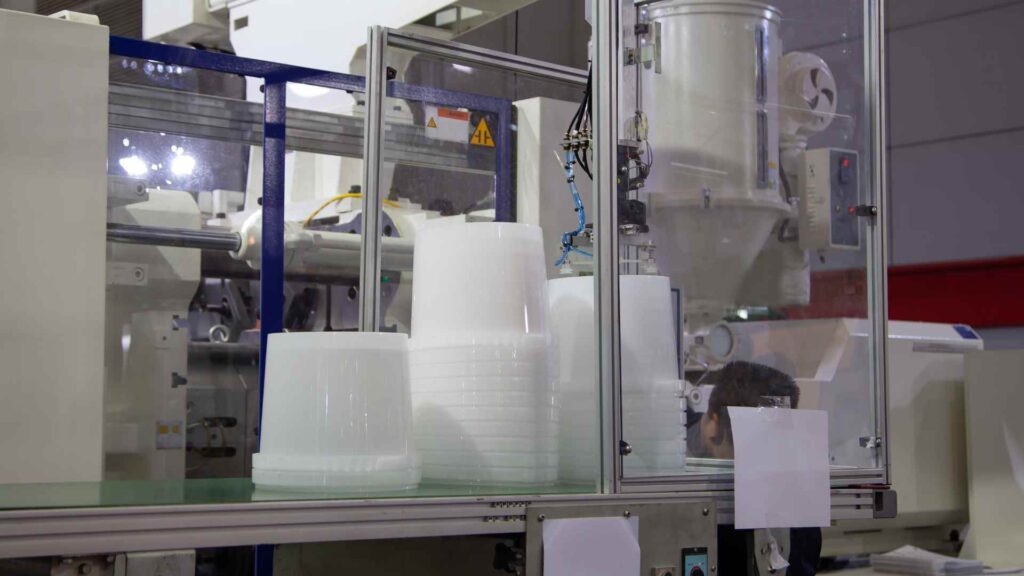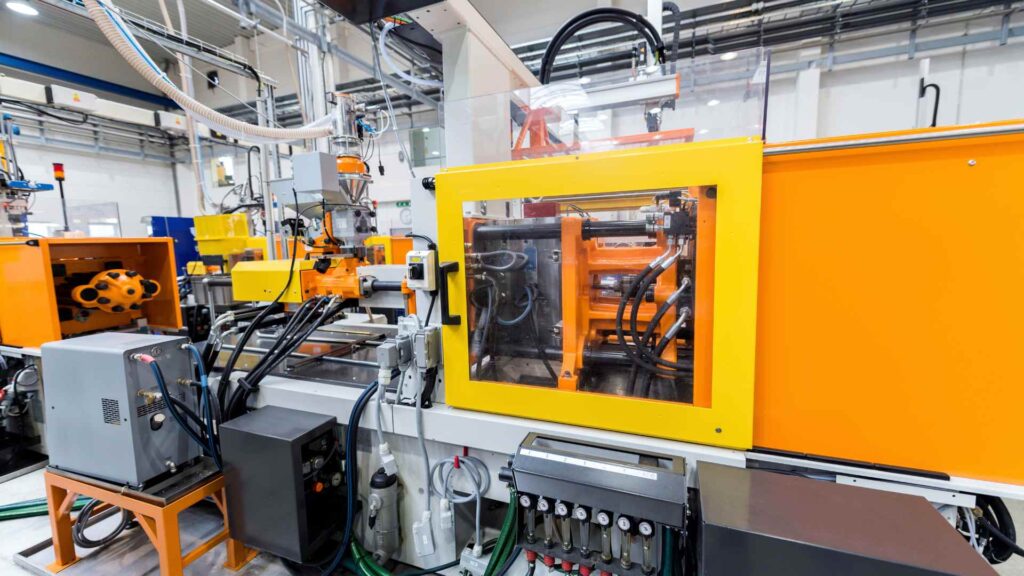Plastic injection molding should not be complicated. SPF Groups welcomes all contract or custom plastic molding inquiries for customers who need a reliable, experienced production partner. Our primary focus is to provide you and your customers with excellent quality and service. SPF’s large tonnage machines serve a wide variety of custom molding needs. SPF offers contract molding with machines ranging from 300-1800 tons.
Contact Us Today For More Information
PLASTIC INJECTION MOLDING CAPABILITIES
- 300-ton to 1800-ton Clamp Sizes
- 20-ton Overhead Crane
- On-Site Warehousing
- Branding Options
- Daily QC Programs
- In-House Tool Repair Shop
- Material Recycling/Grinding
- Material Silos
- Preventative Maintenance Programs
- Water Chillers
1
Contract Molding Capabilities
2
Dedicated Customer Service
SPF Plastic Injection Molding Options
SPF Groups specializes in plastic injection molding to help companies create or source high-quality and durable plastic solutions for industrial applications of all types. We offer custom molding services, new product development and contract manufacturing options for any customer who needs to find an injection molding partner with competitive pricing.
Injection molding is a proven technology used for manufacturing plastic parts and components such as automotive parts, electronic components, AS/RS warehouse automation bins, milk crates, horticulture containers, bakery trays, municipal roll-out carts, recycle bins, attached lid containers, RPC’s, poultry bins, paint buckets, housewares, GMA approved pallets, medical devices, construction materials, appliance parts, HVAC components and retail solutions. The technology offers a cost-effective method for companies to produce virtually any 3D solution with exacting tolerances in medium-to-large quantities.
Frequently Asked Questions
What is plastic injection molding?
How does the plastic injection molding process work?
- Mold/material selected (design/mold/material)
- Mold placed in machine with plastic resin and color (mixing material blend)
- Raw material mixed and super-heated (heating phase)
- Material blend is injected into the mold (injection)
- Material is allowed to cool and take shape (cooling and recovery)
- Finished part or component is ejected (cycle time complete)
What types of molds and machines are used in plastic injection molding?
Plastic injection molds are typically created using oversized blocks of steel or aluminum with a core side and a cavity side. The molds operate by opening and closing each side. A 3D void is created on the inside of the mold and the finished product is created when the mold is clamped together using an injection molding machine and molten thermoplastic resin is injected to fill the void. Chilled water lines integral to each specific mold allow the finished product to cool and solidify.
Molds can be simple single cavity designs that produce one part per cycle, or they can be multi-cavity with complex pieces that create more detailed product features like attachment points, air vents or handles. Each mold gets a rating for clamp tonnage that corresponds to the size of injection molding machine or press required.
Machines come in a wide range of sizes and types including electric and hydraulic. As a general rule, small tonnage machines make smaller parts by size and weight. Conversely, larger tonnage machines make larger parts. SPF Groups currently offers 300-1800 ton machines for medium to large molds but we are always looking for flagship partners to expand our capability.
Why does the plastic injection molding industry continue to enjoy a long-term compound annual growth rate (CAGR)?
Despite the challenges that the world experiences in terms of recycling methods and rates, many plastic applications are undeniably the most cost-effective and sustainable options available. Plastics describe a wide range of thermoplastic and engineered resins that provide lightweight and durable parts or components for products used across the globe. Major industries like automotive, food & beverage, medical increasingly use plastic injection molded parts to develop solutions for the circular economy. Depending on the material selected for any given application, injection molding produces solutions that are easily reusable, returnable and recyclable.
What are the benefits of plastic injection molding?
Flexibility
Efficiency
Repeatability
Quality
Cost-Effective
What should you look for in an injection molder as a partner?
- Convenient location
- machine sizes
- Resin silos
- Pneumatic resin handling
- Overhead crane
- QC process
- Safety protocols
- In-house mold repair
- Inventory space
- Shipping
- Design
- Prototypes
- Testing
- Reprocessing
- Recycling
What is the difference between contract plastic injection molding or contract manufacturing and custom plastic injection molding?
Contract injection molding refers to customers who already own specific plastic injection molds and outsource the part production. These customers look for a quality molder in the best location to establish a flagship partnership.
Custom injection molding refers to customers who engage a plastic injection molder to assist in the design, development, prototyping, testing and manufacture of new or custom plastic solutions. Custom molding includes the new product development process
SPF Groups is both a contract & custom plastic injection molder conveniently located in Byron, GA off I-75 serving the Southeast United States, North America and the Caribbean.
What types of products does SPF Groups specialize in?
SPF Groups manufactures reusable, returnable and recyclable plastic supply chain packaging solutions including products like baskets, bins, carts, crates, components, displays, dollies, lugs, pails, pallets, racks, RPC’s, shells, top frames, totes and trays of all types. Our sustainable packaging focus hinges on identifying closed loop distribution opportunities whereby our customers can benefit from reusable packaging.
SPF Groups now serves over 100 customers in the agriculture, ASRS automation, automotive, bakery, beverage, construction, dairy, grocery, foodservice, material handling, meat, poultry, produce, retail and waste management spaces. Our business model targets a 50/50 balance of customer specific projects and SPF market initiatives.
Why choose SPF for your Contract or Custom Molding needs?
Industry Needs or Challenges: Outsourcing. Innovation. Cost reduction. Machine downtime. Shipping proximity. Demand planning. Mold repairs. Seasonal back-up. Individual customers and plastic molders of all types need reliable primary or contingency injection molding services in a highly capital-intensive business.
SPF Solutions: Yes. It’s true that SPF offers large tonnage machine capacity in the heart of the Southeast United States serving customers of all types throughout the United States of America The States We Serve: Alabama, Alaska, Arizona, Arkansas, California, Colorado, Connecticut, Delaware, Florida, Georgia, Hawaii, Idaho, Illinois, Indiana, Iowa, Kansas, Kentucky, Louisiana, Maine, Maryland, Massachusetts, Michigan, Minnesota, Mississippi, Missouri, Montana, Nebraska, Nevada, New Hampshire, New Jersey, New Mexico, New York, North Carolina, North Dakota, Ohio, Oklahoma, Oregon, Pennsylvania, Rhode Island, South Carolina, South Dakota, Tennessee, Texas, Utah, Vermont, Virginia, Washington, West Virginia, Wisconsin, and Wyoming, and across the globe.
However, in addition to our impressive list of capabilities, our simple, low overhead approach to manufacturing is the real benefit. SPF believes that success is dependent on just the right balance of people, process and purpose to keep our injection molding customers coming back year after year.
Customer Value: As an SPF partner, our customers set the expectations and SPF takes care of the rest. Every SPF customer enjoys full transparency and dedicated customer service just when you need it the most.
That’s why we say, “Let SPF Handle It!”




